to our
newsletter
Urban Settlement Patterns and Development Scenarios. Establishes a foundational understanding of urban systems, mapping dependencies across settlement types, land use, resources, energy consumption, mobility patterns, symbiosis potential, climate risks, and governance structures (Phase I). This informs Phase II's development of scenarios for sustainable urban development, optimizing material and immaterial flows to reduce demand and identify synergies.
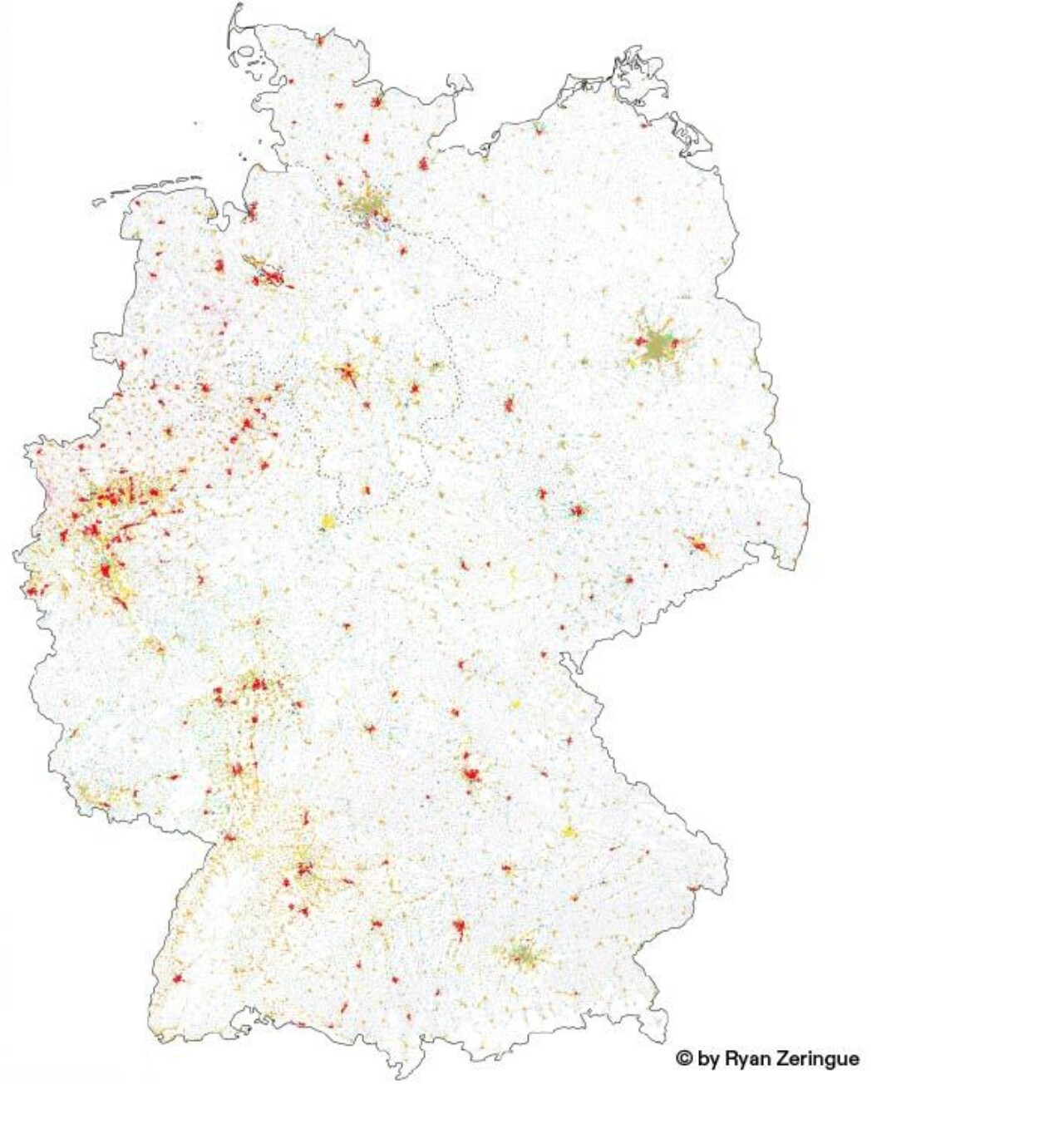
In phase 1, different settlement types are analysed in their multidimensional context and visualised in a 3D regional geomodel. This process forms the spatial research framework for all other research packages and can later be developed into an AI-driven urban dynamic system model (UDSM). For this purpose, urban network areas and the links between them are first determined, from which the study area is defined. Subsequently, the Urban Climate Knowledge Graph (UCKG) developed in the KNOW work package can be linked to the UDSM, thus enabling a spatial model that takes all results into account.
Increasing complexity and uncertainties in urban and regional planning lead to a need to develop precise scenarios.
In 2022, Carlow and others developed a novel method for mapping and classifying territorial settlements and spatial formations that enables a fine-grained analysis of these places. To this end, settlement patterns in relation to mobility, the consumption of building resources, energy and the distribution of open spaces were examined and scenario planning methods were applied to identify critical influencing factors and understand future urbanisation patterns.
Principal Investigators
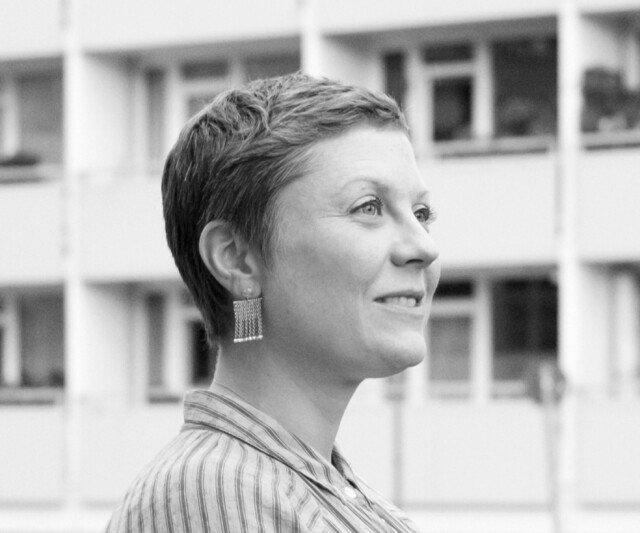
Prof. Dr. Vanessa Miriam Carlow
URB | PI, Speaker UCFL
Institute for Sustainable Urbanism (ISU)
Technische Universität Braunschweig
www.spacelab-isu.org
Prof. Dr. Vanessa Miriam Carlow became Professor at Technische Universität Braunschweig in 2012, where she leads the Institute for Sustainable Urbanism (ISU) and the Spatial Analytics and Cross-disciplinary Experimentation Lab (SPACE LAB). Co-speaker of FUTURE CITY since 2015, her work advances tools for sustainable urban development. She co-founded COBE Copenhagen (2005) and COBE Berlin (2012–2020) and since 2021 heads Vanessa Carlow Urbanism Research Architecture. Carlow studied Architecture and Urban Design at TU Berlin and TU Delft, holds an MA and a PhD in strategic planning from the Royal Danish Academy. Her projects have won Golden Lion and a MIPIM Award.
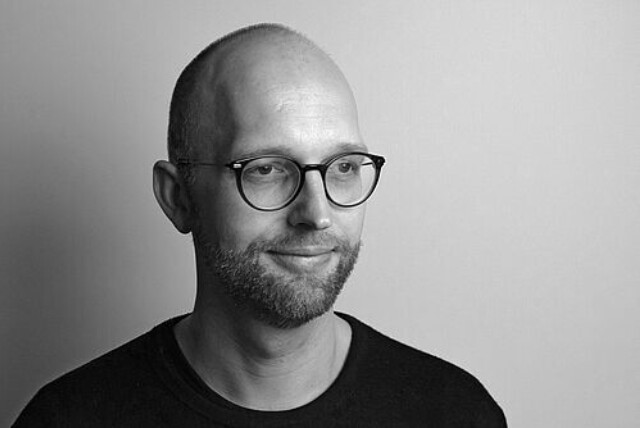
Olaf Mumm
URB | Deputy Head
Institute for Sustainable Urbanism (ISU)
Technische Universität Braunschweig
www.spacelab-isu.org
Olaf Mumm, Dipl.-Ing. (Architekt), is Deputy Director and Senior Researcher at the Institute for Sustainable Urbanism (ISU) and its SpACE Lab at TU Braunschweig. With over 15 years at the nexus of urban design, planning and research, he has led interdisciplinary, design-based projects on urbanization patterns, city structures and knowledge-based planning tools. Mumm joined TU Braunschweig in 2014 following roles at Urban INDEX Institute and Bauhaus-Universität Weimar. He holds a Diploma in Architecture and Urban Design from Bauhaus-Universität Weimar and studied sociology at FernUniversität Hagen. His teaching—such as the iSCOR seminar—earned TU Braunschweig’s LehrLEO award in 2018.
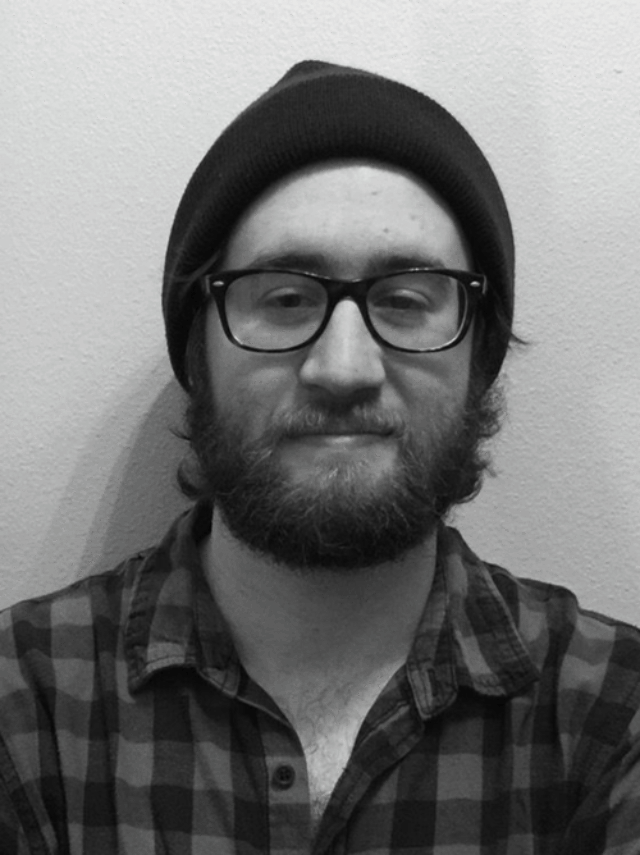
Ryan Zeringue
URB | PhD candidate
Institute for Sustainable Urbanism (ISU)
Technische Universität Braunschweig
www.spacelab-isu.org
Ryan Zeringue is a research associate at the Institute for Sustainable Urbanism (ISU) at TU Braunschweig, where he joined in November 2018. He earned an M.A. in Advanced Urbanism from Bauhaus University Weimar and Tongji University Shanghai (2015–2018), with a master’s thesis on street-grid patterns and walkability, and a B.A. in Architecture from Louisiana State University (2010–2015). His work focuses on TOPOI-based analysis of urban and rural regions, interdisciplinary GIS methods, resilience planning, disaster preparedness, spatial analysis and urban design. Before ISU, he served as project lead at MSH Architects in 2018.
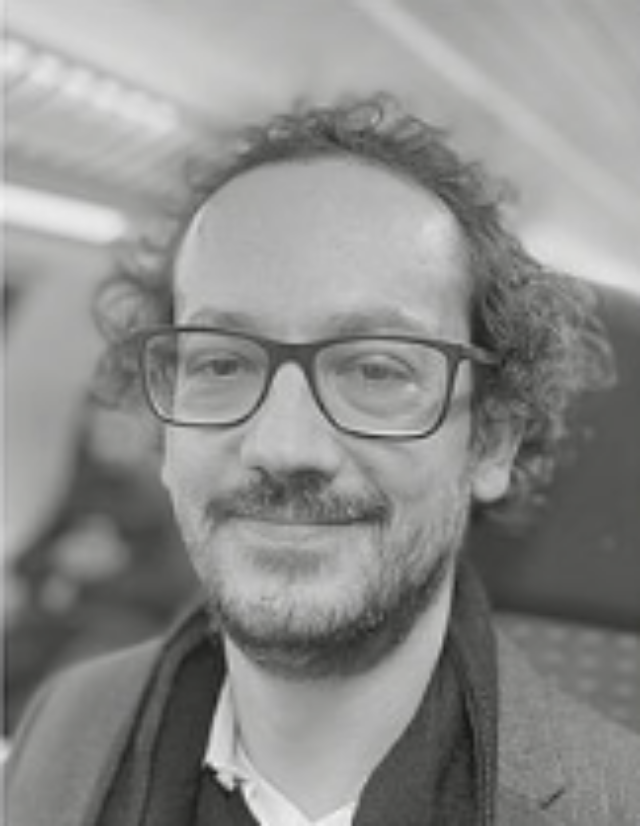
Dr. Esteban Muñoz
URB | General Manager
Institute for Sustainable Urbanism (ISU)
Technische Universität Braunschweig
www.spacelab-isu.org
Esteban Muñoz is a researcher and urban modeler specializing in spatial microsimulation and urban metabolism. With a Dipl.-Ing. (FH) in Architecture, a M.Sc. in Resource Efficiency in Architecture and Planning, and a Ph.D. from HafenCity University Hamburg, he has developed innovative models for urban planning and environmental impact assessment. He served nearly 8 years as a consultant for UNEP, leading projects in circular economy, urban nature, and climate adaptation across the Global South. He co-developed the Circular Jobs Monitor and the SMUM model for simulating urban resource use. Since October 2024, he is General Manager at the Urban Climate Future Lab, TU Braunschweig, where he advances urban sustainability through data-driven policy tools.
Increasing complexity and uncertainties in urban and regional planning lead to a need to develop precise scenarios. In 2022, Carlow and others developed a novel method for mapping and classifying territorial settlements and spatial formations that enables a fine-grained analysis of these places. To this end, settlement patterns in relation to mobility, the consumption of building resources, energy and the distribution of open spaces were examined and scenario planning methods were applied to identify critical influencing factors and understand future urbanisation patterns.
●Chen, H.-H., Mumm, O., & Carlow, V. (2023). A computational approach for categorizing street segments in
urban street networks based on topological properties. Front. Built Environ. Sec. Urban Science 9(2023).
https://doi.org/10.3389/fbuil.2023.1216888
●Abou Jaoude, G.; Murad, M.; Mumm, O.; Carlow, V.; Operationalizing the Open City: A case study in Berlin.
Env Plan B Urban Anal City Sci, 2023. https://doi.org/10.1177/23998083231196016
●Verma D.; Mumm O.; Carlow V.; Generating citywide street cross-sections using Aerial LiDAR and detailed
street plan, Sustainable Cities and Society, 104673, 2023. https://doi.org/10.1016/j.scs.2023.104673
●Abou Jaoude, G.; Mumm, O.; Karch, A.; Carlow, V.; Understanding land take in small and medium-sized
cities through scenarios of shrinkage and growth using autoregressive models. Front. Built Env., 8, 2023.
https://doi.org/10.3389/fbuil.2022.908698
●Abou Jaoude G.; Mumm O.; Carlow V.; An Overview of Scenario Approaches: A Guide for Urban Design
and Planning", J. Plan. Lit, 37(3), pp. 467-487, 2022. https://doi.org/10.1177/08854122221083546
●Carlow V.; Mumm O.; Neumann D.: Schneider A.K.; Schröder B.; Sedrez M.; Zeringue R.; "TOPOI –
Method for analysing settlement units and their linkages in an urban–rural fabric", Env Plan B Urban Anal
City Sci, 49(6), pp. 1663-1681, 2022. https://doi.org/10.1177/23998083211043882
●Zhu, P.; Mumm, O.; Zeringue, R.; Endres, E.; Carlow, V.; Building-related resource use in Chinese eastern
cities – Qingdao building stock as a case study. Applied Energy, 313, p. 118697, 2022. https://doi.org/10.1016/j.apenergy.2022.118697
●Verma D.; Mumm O.; Carlow V.; Identifying Streetscape Features Using VHR Imagery and Deep Learning
Applications Remote Sensing, 13(17):3363, 2021. https://doi.org/10.3390/rs13173363
●Tempelmeier N.; Rietz Y.; Lishchuk I.; Kruegel T.; Mumm O.; Carlow V.; Dietze S.; Demidova E.; Data4UrbanMobility:
Towards Holistic Data Analytics for Mobility Applications in Urban Regions, WWW2019, 2019.
https://doi.org/10.1145/3308560.3317055
●Gerike, R., Carlow, V., Görner, H., Hantschel, S., Koszowski, C., Medicus, M., & Krieg, M. (2023). Vibrant
streets: characteristics, success factors and contributions to sustainable development. nbn-resolving.
https://nbn-resolving.org/urn:nbn:de:bsz:14-qucosa2-872011
●Carlow V.; Gräser Y.; Hagedorn A.; Löhdefink M.; Mumm O.; Move in the City – Ansätze datengetriebener
Analyse von Stadträumen und die Umkehr des Assistenz-Gedankens in partizipativer Stadtentwicklung,
(Move in the City - Approaches to data-driven analytics of urban spaces and inversion of the assistance
concept in participatory urban development.) in Assistive Technologien im Sozial- und Gesundheitssektor,
E.W. Luthe, S.V. Müller, I. Schiering, Eds. Wiesbaden: Springer VS, 2022. https://doi.org/10.1007/978-3-658-34027-8_33
●Abou Jaoude G.; Appelhans N.; Carlow V.; Mumm O.; Murad M.; Schröder B.; Trapp J.H.; An Interdisciplinary
Approach to Understanding the Open City, Trialog, vol. 136, pp. 41-46, 2020. https://doi.org/10.24355/dbbs.084-202109061403-0